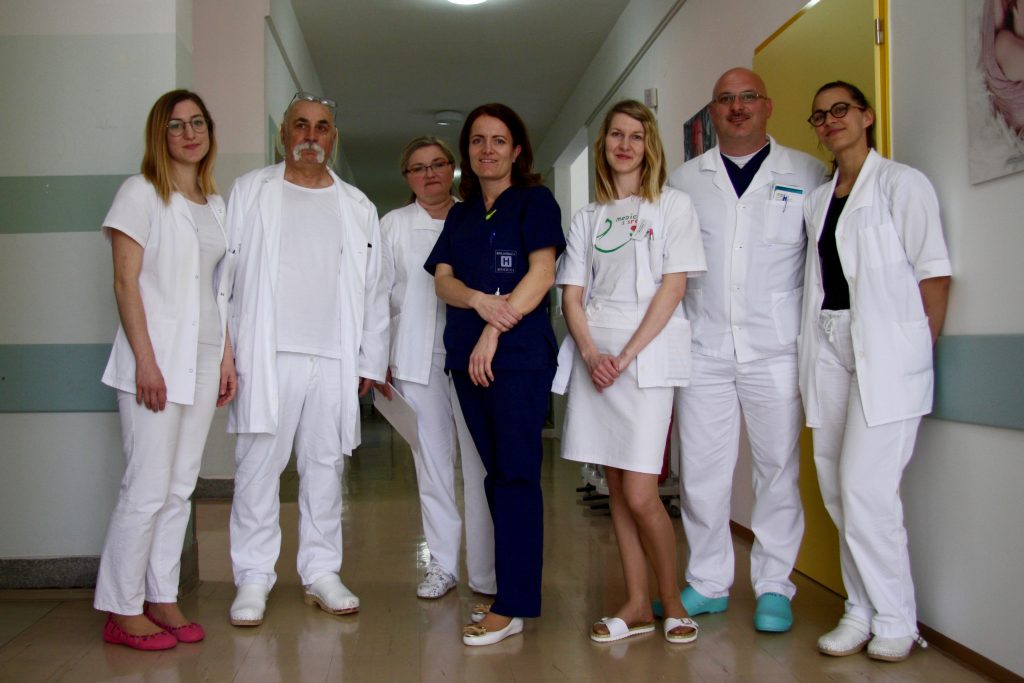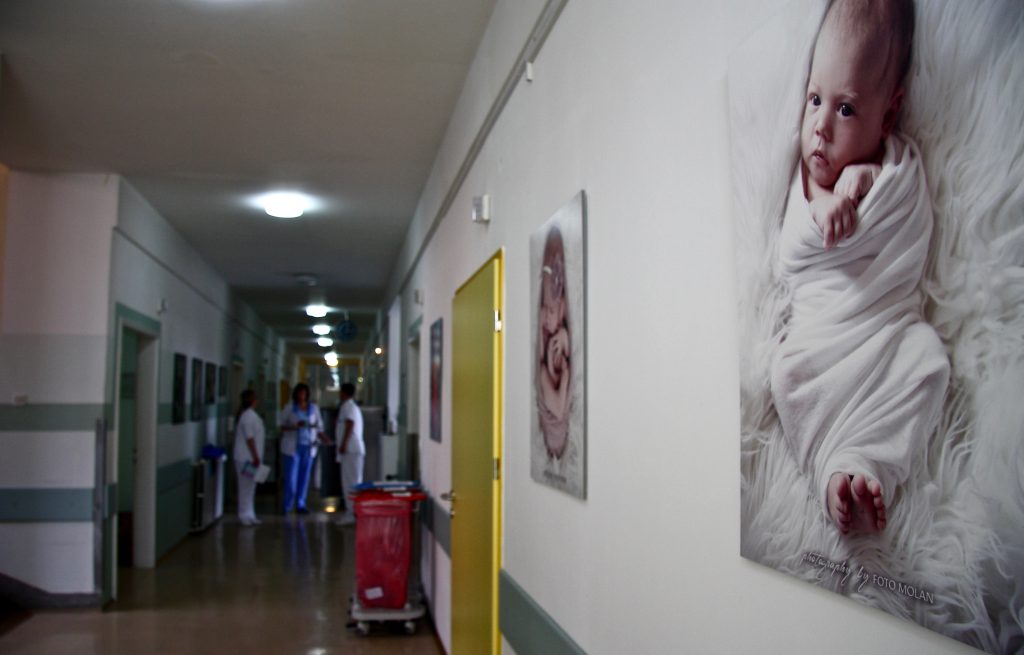-
Both Balkan countries use legislation based on the Yugoslavian law on the right to terminate pregnancies on demand, so why do Croatian women travel abroad to access an abortion?
-
Meanwhile, Croatian pro-life organisations have received at least 0.5 million Euro from foreign sources over the last five years
In the sleepy Slovenian town of Brežice near the Croatian border is the smallest general hospital in the country. Led by a team of women, the gynaecology department has sparkling floors, soft-focus photographs of smiling babies across the walls, the latest ultrasound equipment, and private rooms with their own ensuite toilet.Every week, women from Croatia phone or send an email to the hospital seeking an abortion in Brežice. Their numbers are increasing. For the whole of 2018 there were 54 requests and, in the first three months of 2019, this grew to 25. Many come from the capital, Zagreb, which is only 32 kilometres away.
“This is not a mass of women,” hospital director Anica Hribar tells us, “we don’t have a line outside.”
Almost all patients seek medical abortions, which include two pills they must take over a 48-hour period, so women must cross the border for two visits.
On the second stay, a patient rests in a private bedroom for five hours, until her uterus expels its contents.
Afterwards, the doctors check the reproductive organs with an ultrasound, and talk to the women about the experience. Most patients are in their late teens or early 20s, some are older, but can be as young as 15.
However Slovenia and Croatia have based their law on the same legislation on abortion from 1977, when both were constituent republics of Yugoslavia. This allows abortion on request within the first ten weeks of pregnancy and only afterwards if the pregnancy is the result of a crime, is a risk to a woman’s health or life, or if the foetus is damaged.
So why are Croatian women making the cross-border trip?
One reason is that the abortion pill is easier to access in Slovenia than in Croatia. Another motivation is expense. In Croatia, the average price is 300 Euro, while in Slovenia the cost for medical abortion is 200 Euro. “It’s not much, just to cover our expenses, we don’t want to go higher,” says the hospital’s gynaecologist Nataša Kočnar.
Women often feel more comfortable travelling to a place far from home. “Distance could be a reason,” says Kočnar. “[The women think] nobody knows me in Slovenia. This correlates with guilt. They don’t want anyone to know.”
But a major reason is the majority of medical staff in Croatia refuse to perform abortions, because the country is staunchly Catholic, and doctors face pressure from anti-choice organisations to renounce the procedure.
Slovenia is also a Catholic country, but hospital director Anica Hribar argues that the Church’s influence on women’s choices is not having such an effect.
“I think women [in Slovenia] are quite strong, they don’t want to take us back 50 years,” she adds.
Doctors refusing to perform abortions is also a rare phenomenon in Slovenia.
“We never felt we had to do something because of politics or religion or something else,” adds Kočnar, “and have never had pressure from above, just pressure from the bank, and not to spend too much.”
Conscience-based refusal on rise
Since 2003, doctors in Croatia can legally opt out of abortions, and their numbers are increasing. By 2018, 59 per cent of health workers (218 of 371) in hospitals where women can request abortions refused to perform the procedure, according to the Ombudsperson for Gender Equality in Croatia. This is a four per cent rise on figures for 2014. Three quarters of the staff would not state why, while 12.4 percent said it was for religious reasons, and 12.4 percent for ethical reasons.
This upsurge has shocked many in the medical profession, such as Jasenka Grujić, a pro-choice gynaecologist. She argues that behind this boom is “the silent work of the Catholic church” and “many loud organisations” who speak on the Church’s behalf.
“I think my colleagues who use the conscience clause are not on the side of women, but on the side of the Catholic church,” says Grujić, “they are traitors of the women, they are not professionals.”
This year, the Croatian government also allowed the use of medical abortion in all hospitals. However, because of the high number of doctors refusing to perform abortions, “this will not increase access to abortion and women will still travel abroad,” argues Sanja Cesar, executive board member for NGO the Center for Education, Counselling and Research (CESI).
Because the majority of doctors are invoking the clause, many junior doctors feel they have to conform, argues Grujić. But there are also other sensitive situations which touch on political tensions. “One of my colleagues is of Serbian nationality, and he had no conscientious objection to abortion,” says Grujić. “But somebody told him he was a killer of the Croats, and after that he said: ‘From today I have conscientious objection, and I am not doing abortions’.”
Abortion “guaranteed for women in Croatia by law”
Doctors who refuse to provide abortions should refer patients to other colleagues where they can access this service in their own hospitals. However in some places this is impossible.
“According to national law, conscientious objection is the individual right of health workers, but not the right of health institutions as a whole,” says Višnja Ljubičić, ombudsperson for Gender Equality. “Legally induced abortion is a medical procedure guaranteed for women in Croatia by law, so it should be accessible in all hospitals that are authorised to provide it.”
In 2015, there were 30 healthcare institutions in Croatia where women could request an abortion, but six of these would not provide the service. Because women must have access to abortion on demand under UN rules, the Government ordered all these hospitals to provide the service. Three hired external medical experts to perform abortions, while two hospitals (OB Našice in the north-east of Croatia and KB Sveti Duh in the capital, Zagreb) referred the patient to other institutions.

Medical team at Brezice hospital, Slovenia, which is seeing an increase of women coming from Croatia for abortion. PHOTO: Michael Bird
In Sveti Duh, women could go to another hospital in Zagreb. But in Našice, women must travel an hour’s drive to the city of Osijek for the procedure. OB Našice’s director Hrvoje Šimić tells us: “We are not doing interruptions of healthy, vital pregnancies” and confirms he refers them to the sister hospital 53 kilometers away.
However, because hospitals must hire gynaecologists to perform the operation, there can sometimes be a long waiting list for a woman to access an abortion, according to CESI’s Sanja Cesar – and women in this situation cannot afford to delay the procedure.
Doctor: “I am the Child’s Attorney”
Although doctors who refuse must, by law, refer women to another practitioner, many convince the women not to have abortions.
“About 50 children were born after I had a conversation with women who were about to quit,” Dr. Ivan Zmijanović, head of the Department of Gynaecology and Obstetrics at the General Hospital of Šibenik told publication Slobodna Dalmacija. “These conversations are not easy and pleasant, seeking patience, understanding, and mutual trust. At the very beginning of the conversation, I say that I am a child’s attorney and that – as his attorney – he says why he wants to stop pregnancy, and then I will say: why not stop it.”
Meanwhile the President of the Croatian Medical Chamber (who is now no longer in this post), Trpimir Goluža, was pictured at an anti-abortion ‘March For Life’ in 2017, where he took a photo of himself in a ‘March for Life’ t-shirt and posted this on his Facebook page, drawing huge criticism from pro-choice NGOs.
Many senior Croatian doctors believe that abortion on request is not a medical procedure. The director of the University Hospital Center in Zagreb (KBC), Ante Čorušić, who has “convinced a third” of his patients “to change their minds and not proceed with abortion” argued this year that “intentional termination of pregnancy is not a treatment, but a medical service on demand”, and, in this case, the woman is not a patient, but a “client or user” of the service.
For pro-choice doctor Jasenka Grujić, this attitude is a tragedy. “Abortion is seen as something cosmetic,” she says, “like asking for a facelift.”
But who is the Catholic Lobby?
Around 86 per cent of Croats identify themselves as Catholic, according to a 2011 census. Therefore organisations with religious inspiration often claim they speak for the majority of Croats when declaring the laws of the country should change to fit the tenets of the faith.
In 2013, a citizen’s initiative run by ex-journalist Željka Markić’s organisation ‘In the Name of the Family’ supported a referendum on changing the Croatian constitution to clarify that marriage can only be between a man and a woman. From the Croats who voted, 66 per cent agreed to keep marriage heterosexual. This victory has since given headway to the Catholic movement, which has been named a conservative revolution.
Pro-life groups in Croatia complained to the Constitutional Court, declaring that the Yugoslavian 1978 abortion law was unlawful, as it was in violation of Croatia’s 1990 Constitution which states in Article 21 that “every human being has the inalienable right to live”.

Plastic foetuses present at ’40 days for life – Vukovar’ Event. PHOTO: Facebook
But as the 1978 law predated the current Croatian Constitution, the Court requested that the Croatian Parliament adopt new legislation by early 2019. The deadline has passed with no new law in place. In the interim, the Ministry of Health has appointed an advisory group of specialists to analyse legal solutions and experiences in EU countries on the subject. However this group has faced criticism from civil society for including only gynaecologists who invoke conscientious objection to abortions. “It is mad, it is not possible that one person does not believe [in conscientious objection] in this group,” says Jasenka Grujić, pro-choice gynaecologist.
In response, the Ministry of Health told us in a statement: “The members of the Advisory expert team were chosen according to their expertise and not according to their general opinion. Among them are gynaecologists and neurologists, university professors and lawyers, with many years of work in their profession and remarkable professional results.”
View from the Priest: “I think we are a pro-life nation”
Since 2007 Father Damir Stojić has been Campus Minister at the University of Zagreb, and is part of the Salesian Order, a Catholic order which works with young people. Thousands turn up to his meetings where he preaches on the central tenets of the faith.
“I am known in Croatia for being very unspoken,” he tells us in a cafe in Zagreb. “A lot of the media might classify me as radical and fundamentalist but everything that I say is from the catechism of the Catholic church. There is no compromise, I do not water down the faith and I think young people like that.”
Stojić believes Croatia is experiencing a “pro-life” wave.
“I think we are a pro-life nation,” he says. “It is clear that human life begins at conception, with the union of the sperm and ovary.”
In his job at the university, Stojić has counselled girls who are pregnant and unsure what choices to make. “I give them all the support I can to help them bring the child to life,” he says, “till now I haven’t had one case where I counselled a girl and she decided to abort.”
In cases of rape, he believes abortion should not be permitted. “I think violence should not be answered with violence,” he says, “if [the woman] conceived after rape, we have two victims – the first victim is the woman and the second is the unborn child, and the child is not at fault, I would help her and would help her come to terms to love and help the child, because human life is viable and sacred. I will show you ultrasound pictures of two unborn children, one was conceived in rape, one wasn’t – how would you know which is which?”
But if abortion is illegal, we ask him, isn’t this a case of the state interfering in what a woman does with her own body?
“We have a lot of instances where the state is telling us what to do with our body,” he replies. “If a cop stops me in a car and I don’t have my seatbelt on, I can say ‘my body, my choice’. A lot of buildings are smoke free, I cannot light up: ‘my body, my choice’. The logic here is there’s another body involved. We have two subjects here, there is another person involved, and that is where the dividing line is.”
0.5 million Euro Foreign Support for Croat Pro-Life Cause
Many pro-life organisations in Croatia are funded from outside of the country. Local civic activist group Vigilare includes, as one its main channels of action, “protecting the right to life from natural conception to natural death” and calls on its supporters to lobby politicians and heads of institutions. The NGO received at least a total of 197,957 Euro of donations from foreign entities in 2016 and 2017. Vigilare would not tell us the origin of this money.
The powerful Polish anti-choice legal organisation Ordo Iuris, which has drawn up legal advice on how Poland can organise a blanket ban on abortions, is sharing strategies with Ordo Iuris Croatia, a new organisation set up this year.
A lawyer at Vigilare, Tomislav Čunović, is the name on the founding document of Ordo Iuris Croatia.
“Ordo Iuris in Croatia is established by Croatian lawyers, whose mission is similar to the one of Ordo Iuris Institute’s in Poland,” reads a statement from Ordo Iuris Poland. “Our experts share with our colleagues from Croatia expert knowledge, experience and know-how. There are no financial transfers between the organizations.”
Also active in Croatia, is US Virginia-based Catholic organisation Human Life International, a staunchly anti-abortion association, which calls contraception “the root of the Culture of Death”.
The organisation has been financing grants in Croatia since at least 2002, and between 2015 to 2017 offered grants worth a total of 122,441 USD to the country. The World Youth Alliance (WYA) is a US-based charity has a mission in “defending and promoting the dignity of every human person, from the moment of conception until natural death”
The WYA is financed by American Catholic billionaire Sean Fieler’s Chiaroscuro Foundation, which has given the organisation 1.86 million USD between 2012 and 2017. In Croatia the founder Anna Halpine has stated that her NGO would do its best to prevent what it called harmful policies on abortion, birth control and sex education.
Active in the educational and cultural sphere, the WYA has integrated its Human Dignity Curriculum (HDC) in two schools in Croatia “and are receiving support for the program from the Croatian Government”, and the Government has approved the use of the HDC in more of its schools. Meanwhile its European affiliates in Croatia, Austria and Belgium have won grants worth a total 63,000 Euro in EU financing through the Erasmus program, for work on youth initiatives.
Additionally, ‘Svjetski savez mladih Hrvatska’, the local subsidiary of WYA, received 36,543 Euro for their operations from foreign sources. Other pro-life organizations, or those associated with the movement, based in Croatia founded after 2009 which received financial support from foreign entities in the last five years are ‘Udruga ime dobrote’ (In the Name of Goodness) (127,710 Euro), ‘Udruga U ime obitelji’ (In the Name of the Family) (25,322 Euro), ‘Centar za obnovu kulture’ (Center for the Renewal of Culture) (17,504 Euro), ‘Glas roditelja za djecu – GROZD’ (Parents’ Voice for Children) (13,117 Euro) and ‘i Marijini obroci’ (Mary’s Meals) (7,331 Euro).
Altogether, at least 534,499 Euro has been donated from foreign entities to Croatian pro-life organizations, which influence the public discourse in Croatia. However, the names of donors cannot be identified in annual reports.
None of the above organizations responded to questions about the source of their foreign donations, except ‘In the Name of Goodness’, which is one of the founders of private Catholic television channel Laudato TV. Its main purpose is to collect resources for the existence and operations of the TV station.
“We have domestic and foreign donors, who are generally private persons,” says program coordinator at Laudato TV, Mateja Potroško. “We received also donations from the Subcommittee to Aid the Church in Central and Eastern Europe of the U.S. Conference of Catholic Bishops. This helped us in paying contractual obligations to Vatican media Vatican News.”
Pro-life tactics used in Croatia have taken inspiration from the United States. In 2014, American pro-choice activist Lila Rose gave a speech in Croatia, and stated: “I’m glad I can advocate the right to life in Croatia. Croatian women deserve something much better than abortion.”
Every year, the country undertakes a ‘March for Life’ inspired by the annual protest in Washington DC against the liberalising of the abortion law in 1973. In 2016 the Zagreb march was attended by Sanja Orešković, the wife of the then Croatian prime minister, Tihomir Orešković. “Every prudent person will choose life over death,” Orešković told reporters at the time.
During Lent, Croat pro-lifers also pray outside hospitals for 24 hours, seven days a week, in a demonstration called ‘40 Days for Life’, This is part of a Texas-based international initiative to take direct action to the places where abortions are performed. In Croatia, 40 Days for Life was financially supported by Vigilare in 2017.
“They are praying,” says Priest Damir Stojić. “They are using prayer. The most influential people in the world are not politicians or rock stars, but people whose prayers are answered.”
On 24 March 2019, 40 Days for Life organised an event in a city in eastern Croatia, Vukovar, where Dr. Mirjana Radan, a specialist in gynaecology and obstetrics, lectured on the Conscience Clause. The Facebook page for ‘40 Days for Life – Vukovar’ covered the speech by showing a photo of a box of plastic model foetuses on a table at the event.

An increasing number of women have been travelling from Croatia to Slovenia’s Brezice hospital for abortions. PHOTO: Michael Bird
An increasing number of women have been travelling from Croatia to Slovenia’s Brezice hospital for abortions. Picture: Michael Bird
The organisers advertised that attendance by doctors could be scored according to the rules of the Croatian Medical Chamber (HLK), which are educational points which allow medical professionals further qualifications. However, the Chamber told us the organisers did not report to them, “according to the established criteria”, and “as a result there could not be any points for the doctors’ lectures”. 40 Days for Life Croatia did not respond to questions on why they advertised the event with such a point system.
Asked why so many of these strategies for protesting against abortion come from America, Stojić says: “We are wearing American shoes and clothing and using credit cards, listening to American culture and music and watching their films, so whatever is good is good. I don’t see a problem with that.”
However this atmosphere creates pressure on women seeking an abortion. “There is a rise in doctors’ objection of conscience, and stigma about abortions powered by 40 Days for Life, March for Life and similar activities,” argues Marinella Matejčić, activist at NGO Znaj Znanje and member of Rijeka-based organisation PaRiter.
Referendum: “People wouldn’t take away the right to an abortion”
In Croatia, there is debate on whether a vote should take place on banning abortion, although this has not yet reached legislative level.
NGO Cesi’s Sanja Cesar believes that if the Government adopts a progressive law on terminations of pregnancy, “there is the possibility that ultra conservatives will try to organise a referendum on abortion.”
But Ivana Ninčević Lesandrić, an independent Croatian MP, does not believe in the efficacy of such a ban, as women will find ways around such prohibition. “Everyone will go to Bosnia, Hungary and Slovenia and do it there, and it will be done backstreet,” she says.
Despite his anti-abortion views, Damir Stojić argues that if there was a public vote on the subject, it is unlikely that his views would prevail.
“I think if there was a referendum, most people would be pro-life, but they wouldn’t take away someone’s right to have an abortion,” he says. “A referendum would probably not go our way. I hope I’m wrong.”
Poland and Romania: Refusals on Rise
As revealed last week in Nacional, many European pro-life organizations are coordinating their work in an informal group called Agenda Europe, where many of their members are listed. A large number of these organisations were contained in a figure of 2.1 to 3.1 million Euro in allocated spending lobbying EU institutions by organisations connected to a pro-life cause, according to the EU transparency register.
Many such associations are supportive of doctors who invoke the conscience clause to refuse to terminate pregnancies. In some countries in Europe, there are growing numbers of medical staff deciding on veto. In Italy, 68.4 per cent of medical professionals refused to partake in abortions, according to the Ministry of Health in 2017, while in the eastern European countries Romania and Poland, the numbers are also high.
In Romania, new research by Nacional’s partner publication, The Black Sea, has revealed 60 hospitals from a total of 189 are refusing to perform abortions.
Meanwhile in Poland, where abortion is banned on request, most women travel abroad to access this procedure, or take medical abortion at home, even though this is illegal.
Hospitals can perform abortion in Poland if the health of the women is at risk, if the foetus has abnormalities or if the pregnancy is a result of a criminal act.
However abortions happen in only ten percent of facilities (around 40 from 400) obliged by the state to provide the service, according to NGO The Federation for Women and Family Planning (Federa). The south-east of Poland sees hardly any hospitals undertaking the procedure.
“We have extremely difficult access to legal abortion services, there are whole regions that don’t perform abortions – because all doctors from these regions signed conscience clauses,” says Federa’s President Krystyna Kacpura. “Hospitals as state institutions are not allowed to use the clause. This is illegal – but nobody pays any attention to this.”
-
This report was made possible with support from Journalismfund.eu.


































Komentari